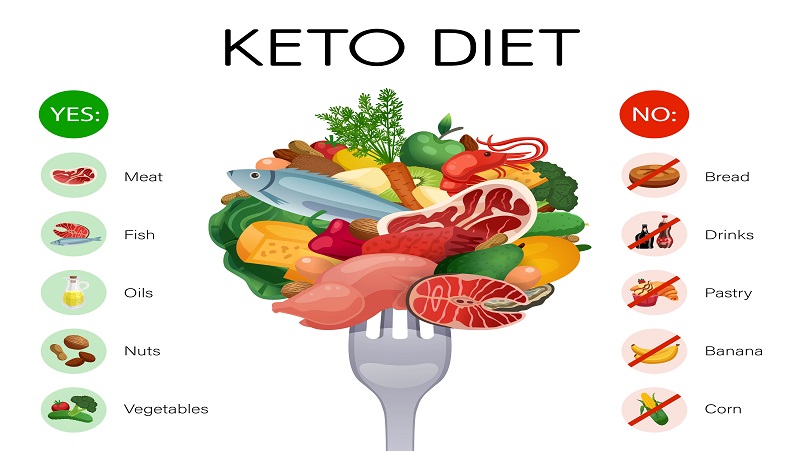The Ketogenic Diet, also known as the keto diet, has become extremely popular in recent years due to its potential to aid weight loss and address health conditions. A low-carb, high-fat diet, the ketogenic diet restricts the intake of carbohydrates and replaces them with fats. The end result is that your body transitions into ketosis, a metabolic state in which your body relies on fats for energy.
The ketogenic diet has been utilized for many years as a treatment option for medical conditions such as epilepsy. Other benefits of keto diet include:
- Weight Loss: By limiting carbohydrate consumption, the ketone diet helps to eliminate excess water from your body. Insulin levels begin to decrease in the body, leading to rapid weight loss.
- Blood Sugar Control: Cutting carbs lowers blood sugar and insulin drastically. This could be particularly helpful for people dealing with type 2 diabetes or prediabetes as keto foods may assist in stabilizing blood sugar levels.
- Improved Heart Health: Some research indicates that following a low-carb diet may decrease risk factors associated with heart disease, such as levels and increased HDL cholesterol.
- Enhanced Mental Clarity: Many individuals who eat keto diet foods report experiencing improved focus and cognitive function.
- Boosted Energy Levels: As the body adapts to utilizing fat for energy, many people experience heightened levels of energy.
However, like any other diet plan, the keto diet also comes with its own set of risks and challenges.
The Risks Associated with Ketogenic Diet
1. Keto Flu
The “keto flu” is a set of symptoms that some people experience when they begin a ketogenic (keto) diet. It typically occurs during the initial phase of the diet when the body is transitioning from relying on carbohydrates for energy to using fat as the primary fuel source. The common symptoms of the keto flu may include fatigue, headache, nausea, dizziness, muscle cramps, and difficulty sleeping.
The keto flu is usually temporary and can last anywhere from a few days to a couple of weeks as the body adapts to its new metabolic state.
2. Potential Nutritional Deficiencies
Due to restrictive food intake, the ketone diet can lead to potential nutritional deficiencies. The strict restriction on carbohydrates can lead to deficiencies in nutrients like calcium, magnesium, potassium, and fiber.
3. Digestive Troubles
The high-fat content of the ketogenic diet can lead to digestive issues. Some individuals may experience constipation due to a reduced intake of dietary fiber, while others might face diarrhea. These digestive problems can be uncomfortable at times.
4. Dehydration and Imbalanced Electrolytes
Low carbohydrate intake leads to reduced insulin levels. This causes the body to excrete more water and essential electrolytes like sodium, potassium, and magnesium. Dehydration and electrolyte imbalances are common concerns with the keto diet.
5. Elevated Cholesterol Levels
While some individuals may experience improved lipid profiles on the ketogenic diet, others might encounter elevated cholesterol levels. This increase can be a concern, especially for those with a history of cardiovascular issues. Monitoring cholesterol levels and consulting a healthcare professional is essential to ensure that the diet aligns with overall health goals.
6. Loss of Muscle Mass
In the absence of carbohydrates, the body may break down muscle tissue to obtain energy. This process can lead to a loss of muscle mass, which can be detrimental, particularly if the goal is to maintain or build lean muscle.
7. Social and Lifestyle Challenges
The ketone diet can be socially isolating and present challenges in various situations. This includes dining out with friends and family, attending social gatherings, or following the diet while traveling. Finding ways to navigate these challenges and maintain the diet’s requirements in social and lifestyle contexts can be demanding but is necessary for long-term success.
Ways to Mitigate the Risks of Ketogenic Diet
Though there are some side effects associated with the ketogenic diet plan that cannot be overlooked, the following ways can help you mitigate them and reap the benefits that this low-carb diet brings along:
1. Consult a Healthcare Consultant:
Before initiating any diet, including keto, it is advisable to consult a healthcare professional. This is especially important if you have underlying medical conditions, including diabetes, hypertension, kidney disease, heart or bone ailment. A keto diet consultant can assess your medical history and existing health conditions to determine if the ketogenic diet is safe and suitable for you. They can provide personalized guidance and recommendations to ensure that the keto diet aligns with your health goals and doesn’t pose any risks or complications.
2. Make a Gradual Transition:
Instead of making drastic changes to your diet, like stopping/ reducing carbs altogether, it is recommended to gradually reduce carbohydrate intake. This approach can facilitate a transition into ketosis, lessening the likelihood of experiencing the “keto flu”.
3. Choose Nutrient-Dense Foods:
Emphasize consuming foods that are rich in nutrients to minimize the risk of deficiencies. Incorporate a variety of vegetables and lean sources of protein into your diet. Work with a dietician for a balanced meal plan that’s tailored to your specific nutritional needs and preferences. This approach ensures that you receive essential vitamins, minerals, and other vital nutrients while following the diet.
4. Stay Hydrated:
Make sure to drink an amount of water and consider increasing your salt intake. This helps prevent dehydration and maintain balance.
5. Monitor Cholesterol Levels:
Regularly monitor your cholesterol levels. If there is an increase it is important to seek guidance from your healthcare provider regarding steps to take.
6. Exercise Regularly:
Integrating activity into your routine can help prevent muscle loss while enhancing overall health during the ketogenic diet.
7. Plan and Prepare in Advance:
Make a food list and prepare your ketogenic meal plan in advance. This can help you stick to your diet and minimize the risks associated with spontaneous food choices that may not align with your dietary goals.
The Bottom Line
The ketogenic diet can be a route to swift weight loss, but it’s crucial to approach it with caution. Remember, what proves effective for one person may not yield the same results for another. That’s why, seeking advice from a medical weight loss consultant before embarking on a ketogenic diet plan is a prudent step.
As a board-certified professional, a keto diet consultant will conduct a comprehensive assessment of your current health status and dietary requirements to draft the best ketogenic diet for weight loss as per your health needs.
So, if you’re planning to start a keto diet or have specific weight loss goals, please connect with Dr. Lala at Kinetix and take the first step towards a healthier you with a ketogenic diet. Your path to improved well-being begins here!




